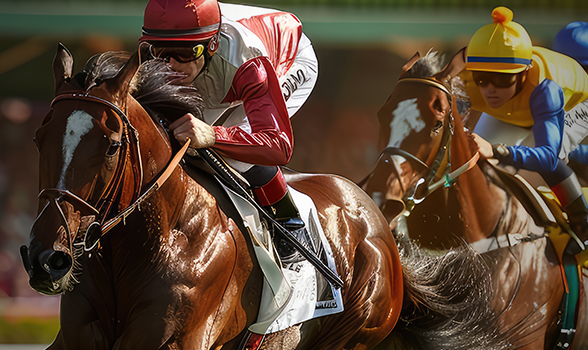
How to Bet on the 2025 Breeders’ Cup

How to Bet on the 2025 Breeders’ Cup
The annual Breeders’ Cup is a year-end culminating event in the world of thoroughbred horse racing. The event was initially formed for elite thoroughbreds from all over the world to challenge the fastest horses North America had to offer. This sense of peak competition has continued to grow and expand for the Breeders’ Cup, which is considered one of the pinnacle events in horse racing.

Importance of Breeders’ Cup in Horse Racing
Most notably, the Breeders’ Cup has become the stage where elite horses of all ages - from throughout the world - attempt to prove they are the best of the best. Unlike the Triple Crown races (the Belmont Stakes, Kentucky Derby, and Preakness Stakes) which are races on the dirt run only by three year olds, the Breeders’ Cup includes fourteen races conducted over two days that are run by horses of all ages and on both dirt and turf courses. Horses qualify from all over the world for the Breeders’ Cup. This adds a global flair to the Breeders’ Cup not present in other horse races.
Breeders’ Cup by the Numbers
14: The number of races that comprise the Breeders’ Cup. These races are spread across a variety of surfaces and age classes, which creates a competitive parity and race-time drama and ensures all of the best horses in the world participate.
2: The Breeders’ Cup is held across the span of two days, making it an event filled with action and prestige.
1 ¼: The distance (miles) of the Breeders’ Cup Classic, the marquee race of the event. Run on the dirt, this race typically features the best dirt horses in the world, including horses that have won Triple Crown races.
$28,000,000: The total amount of purse money up for grabs across the fourteen races that make up the Breeders’ Cup.
4: The number of tracks that have hosted the Breeders’ Cup since 2010: Churchill Downs, Santa Anita Park, Keeneland, and the Del Mar Thoroughbred Club. The 2025 Breeders’ Cup will be held at Del Mar in San Diego, California.
Placing a bet on the Breeders’ Cup
Strategies for betting on the Breeders’ Cup
Before placing your Breeders’ Cup wagers, it is wise to understand that there are numerous factors that can impact the outcome of a horse race. The horse’s past performances, track conditions, weather, training record, and jockey experience all play a role in determining how a horse may perform on a given day. Bettors who have a keen knowledge of horse racing practices, training, and experience with the types of bets will understand their strategy, but there are never any guarantees and it is important to understand the inherent risks involved in any type of wager.
Importance of researching the horses
Before you place your Breeders’ Cup wager, diligent research on the horses involved can help you understand the Breeders’ Cup odds and the nature of risk in your bet.
This research will likely include the horses involved in the current year’s race—but historical research to understand the common characteristics of previously successful thoroughbreds may be helpful information in attempting to select the winning horse in a given race.
Understanding Horse Race Wagering Odds
Wagering on horse racing is conducted through the use of parimutuel pools. This means that the odds presented at the time your wager is placed may not be the odds that you ultimately receive. All odds for Win, Place and Show wagers are determined at the start of the race. Odds are listed in a format that shows your payout (first number) based on your wager (second number). For example, a wager that gives 2/1 odds will return $3 total ($2 in winnings plus your original $1 wager).
Combining an understanding of the odds with research on the horses involved still doesn’t provide any guarantees, nor does it lessen your risk.
Staying disciplined and managing your bankroll
Placing bets of any kind always carries an inherent risk. Gaming responsibly is best paired with clear limits you have set for yourself. Never gamble money you can’t afford to lose—gaming is there for its entertainment value, not as a way to attempt to pay your bills. Chasing losses with risky bets is never encouraged, and responsible gaming is best paired with a hard cap on how much you will spend.
Common Bet Types
Win bet: A win bet is the most straightforward bet—you choose the winner, and a successful wager returns a payout based on that horse’s odds.
Place bet: A place bet offers you a bit more leeway as you are choosing a horse to place either first or second.
Show bet: A show bet offers even more leeway as you are choosing a horse to place in the top three.
Exacta: An exacta bet requires you to choose the winning and second-place horse in the right order.
Trifecta: This bet is similar to the exacta, except you’re now choosing the top three horses in exact order.
Superfecta: For the largest payout, the superfecta is a successful wager in which you choose the first four horses to finish in exact order.
Daily Double: Choose the winner of two separate races.
History of the Breeders’ Cup
Notable Breeders’ Cup Performances
- Mike Smith has the most wins for a Breeders’ Cup jockey at 27—the next closest is John R. Velazquez at 19.
- The first woman to compete as a jockey was Julia Krone in 1988. She raced in three races that day.
- The oldest trainer to win a Breeders’ Cup race was D. Wayne Lukas, who was 79 at the time of his win in the 2014 version of the Juvenile Fillies. Lukas also holds the most wins for any trainer at the Breeders’ Cup with 20 victories.
- Inside Information holds the win by the largest margin, winning the 1995 Distaff by 13.5 lengths.
Notable Past Winners
- Zenyatta holds the record for most lifetime earnings in the Breeders’ Cup, earning $4,680,000. Zenyatta won the Distaff in 2008 and the Classic in 2009.
- Tiznow won back-to-back Breeders’ Cup Classics in 2000 and 2001.
- Goldencents won the Dirt Mile back-to-back in 2013 and 2014.
- Beholder is a three-time winner—winning the Juvenile Fillies in 2012, and Distaff in 2013 and 2016.
- The only other three-time Breeders’ Cup winner is Goldikova, who won the Mile in 2008, 2009, and again in 2010.
